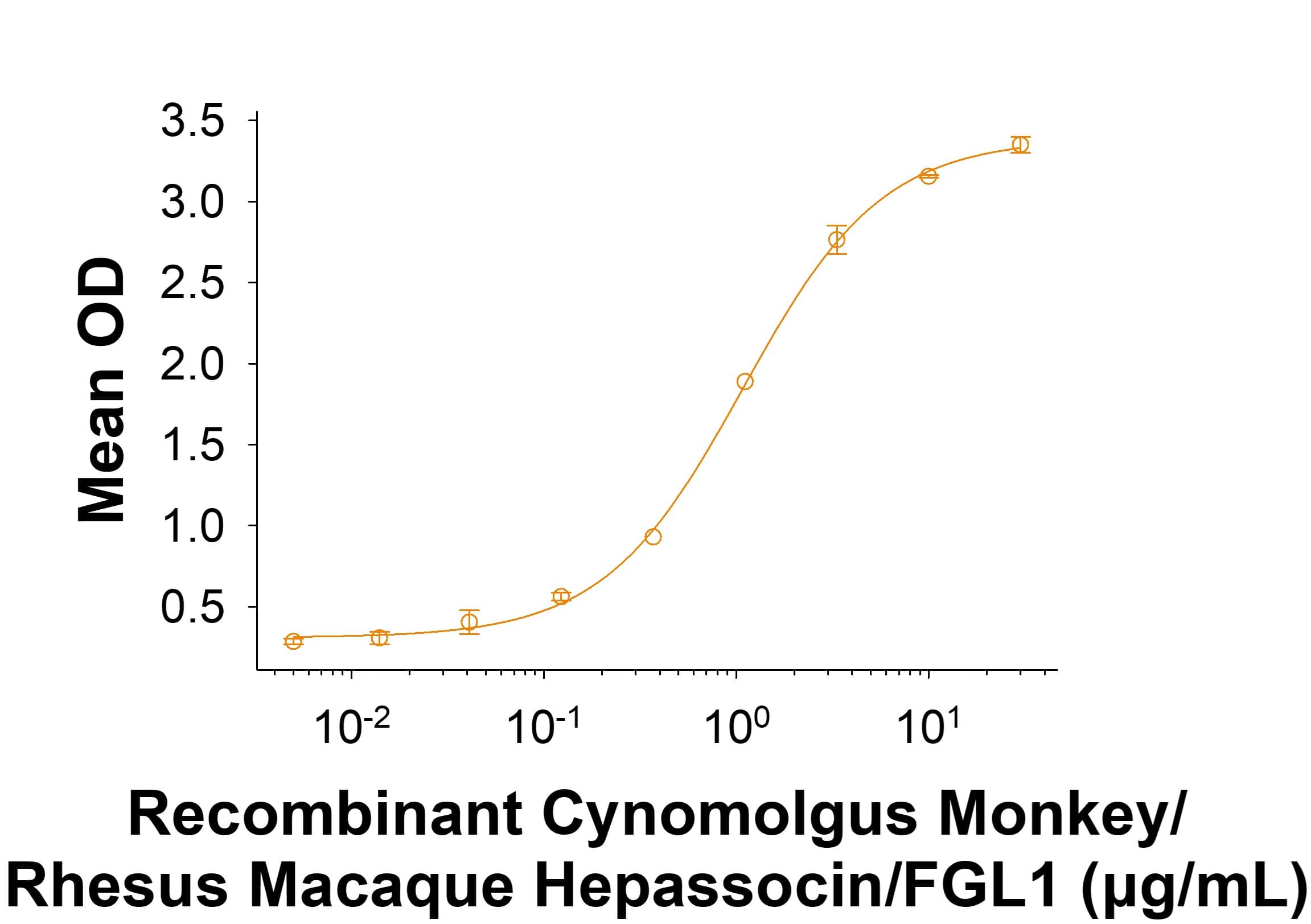Recombinant Cynomolgus/Rhesus Hepassocin/FGL1 Fc Protein, CF
R&D Systems, part of Bio-Techne | Catalog # 11176-HE
Fc Chimera

Key Product Details
Source
CHO
Accession #
Structure / Form
Disulfide-linked homodimer
Conjugate
Unconjugated
Applications
Bioactivity
Product Specifications
Source
Chinese Hamster Ovary cell line, CHO-derived Hepassocin/FGL1 protein
| MD | Human IgG1 Fc (Pro100-Lys330) |
IEGR | Cynomolgus Monkey/Rhesus Macaque Hepassocin/FGL1 (Ala63-Ile348) Accession # XP_005562748.1 |
| N-terminus | C-terminus | ||
Purity
>95%, by SDS-PAGE visualized with Silver Staining and quantitative densitometry by Coomassie® Blue Staining.
Endotoxin Level
<0.10 EU per 1 μg of the protein by the LAL method.
N-terminal Sequence Analysis
Met (of Fc)
Predicted Molecular Mass
60 kDa
SDS-PAGE
58-65 kDa, under reducing conditions.
Activity
Measured by its binding ability in a functional ELISA.
When Recombinant Human LAG-3 Fc Chimera Protein (Catalog # 2319-L3) is immobilized at 2.50 μg/mL, 100 μL/well, Recombinant Cynomolgus Monkey/Rhesus Macaque Hepassocin/FGL1 Fc Chimera (Catalog # 11176-HE) binds with an ED50 of 0.500-4.00 µg/mL.
When Recombinant Human LAG-3 Fc Chimera Protein (Catalog # 2319-L3) is immobilized at 2.50 μg/mL, 100 μL/well, Recombinant Cynomolgus Monkey/Rhesus Macaque Hepassocin/FGL1 Fc Chimera (Catalog # 11176-HE) binds with an ED50 of 0.500-4.00 µg/mL.
Scientific Data Images for Recombinant Cynomolgus/Rhesus Hepassocin/FGL1 Fc Protein, CF
Recombinant Cynomolgus Monkey/Rhesus Macaque Hepassocin/FGL1 Fc Chimera Protein Binding Activity.
Measured by its binding ability in a functional ELISA. When Recombinant Human LAG-3 Fc Chimera Protein (2319-L3) is immobilized at 2.50 μg/mL, 100 μL/well, Recombinant Cynomolgus Monkey/Rhesus Macaque Hepassocin/FGL1 Fc Chimera Protein (Catalog # 11176-HE) binds with an ED50 of 0.500-4.00 µg/mL.Recombinant Cynomolgus Monkey/Rhesus Macaque Hepassocin/FGL1 Fc Chimera Protein SDS-PAGE.
2 μg/lane of Recombinant Cynomolgus Monkey/Rhesus Macaque Hepassocin/FGL1 Fc Chimera Protein (Catalog # 11176-HE) was resolved with SDS-PAGE under reducing (R) and non-reducing (NR) conditions and visualized by Coomassie® Blue staining, showing bands at 58-65 kDa and 120-130 kDa, respectively.Formulation, Preparation and Storage
11176-HE
| Formulation | Lyophilized from a 0.2 μm filtered solution in PBS, NaCl and Glycerol with Trehalose. |
| Reconstitution | Reconstitute at 250 μg/mL in PBS. |
| Shipping | The product is shipped at ambient temperature. Upon receipt, store it immediately at the temperature recommended below. |
| Stability & Storage | Use a manual defrost freezer and avoid repeated freeze-thaw cycles.
|
Background: Hepassocin/FGL1
References
- Yamamoto, T. et al. (1993) Biochem. Biophys. Res. Commun. 2:681.
- Zhang, S.M. et al. (2008) Innate Immun. 14:175.
- Hara, H. et al. (2001) Biochim. Biophys. Acta. 1520:45.
- Wang, J. et al. (2019) Cell. 176:334.
- Yu, HT. et al. (2009) J. Biol. Chem. 284:13335.
- Li, C.Y. et al. (2010) Gut. 59:817.
- Liu, Z. and C. Ukomadu. (2008) Biochem. Briophys. Res. Commun. 365:729.
Long Name
Fibrinogen Like 1
Alternate Names
FGL1, Fibrinogen-like-protein 1, FREP1
Gene Symbol
FGL1
UniProt
Additional Hepassocin/FGL1 Products
Product Documents for Recombinant Cynomolgus/Rhesus Hepassocin/FGL1 Fc Protein, CF
Product Specific Notices for Recombinant Cynomolgus/Rhesus Hepassocin/FGL1 Fc Protein, CF
For research use only
